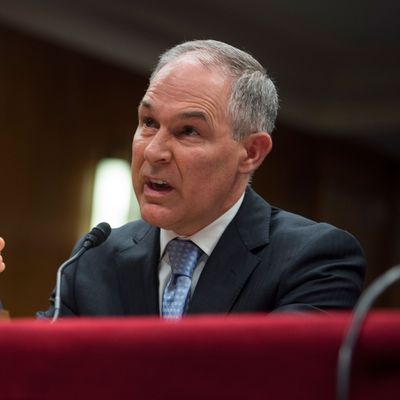
The political world has been waiting with bated breath for an announcement by the president of his choice to succeed Anthony Kennedy on the U.S. Supreme Court. Instead, Trump made breaking news with an unexpected Cabinet move:
It’s especially appropriate that Trump announced Pruitt’s departure on Twitter. Pruitt’s unprecedented pattern of constant scandals provided an eerie parallel to the president’s more profane or mendacious tweets: any one or two would have been un-survivable in past administrations, but had become just part of the strange landscape of Washington under Trump.
The famously terse media site Axios would self-destruct before wasting a single moment of its readers’ busy days by publishing a word more than needed on any news short of the apocalypse. Yet today it listed 17 major Pruitt scandals. And earlier this week the Cut published a list of 15 Pruitt howlers, with considerable detail, ranging from his weirdly elaborate (and expensive) security arrangements to his taste for lavish official travel to his low-cost condo rental from an energy lobbyist to his use of EPA resources and staff to seek a high-paying job for his wife. It’s like the man couldn’t take a breath without doing something sketchy.
And those are just the publicly documented things Pruitt did that raised eyebrows and hackles, making this an entirely legitimate question:
The very abundance of Pruitt scandals makes you wonder what he could have done that finally forced his resignation — assuming it was forced, and that he isn’t about to announce some even more powerful or lucrative gig (just yesterday, Jonathan Chait quite credibly suggested that Pruitt’s strange longevity might be attributable to his availability as a replacement for Attorney General Jeff Sessions, since Pruitt would not have to be Senate-confirmed under the Federal Vacancies Reform Act).
Pruitt’s resignation letter that Trump accepted did not acknowledge any wrongdoing (perhaps on advice of legal counsel), but instead attributed the step to “the unrelenting attacks on me personally [and] my family,” before ending on a characteristic (to Evangelical ears) note:
I believe you are serving as President today because of God’s providence. I believe that same providence brought me into your service.
Considering that his issues would have probably forced him out much, much earlier under most, if not all, of the first 44 presidents, that sentiment is understandable.
The one thing of which we can be sure is that Trump was not troubled by the ongoing scandal of Pruitt’s ideological devotion to the interests of the fossil-fuel industry at the expense of EPA’s core mission. His designated successor Andrew Wheeler is a former coal lobbyist and aide to Senator James Inhofe of Oklahoma, perhaps the most prominent and hammer-headed climate-change denier in Congress.
In any event, we should soon be able to close the books on the Pruitt era at the EPA, where his legendary tenure will likely earn him a spot in history alongside such ethical blackguards as Harding’s Interior Secretary Albert Fall, who accepted bribes for no-bid federal oil leases in the Teapot Dome scandal, or Grant’s War Secretary William Belknap, whose Pruitt-like taste for luxury was supported by kickbacks from military trading post concession-holders.
What’s missing so far in Pruitt’s case is any acknowledgement from his Cabinet peers or the president that he’s done anything wrong. And that may be the biggest Pruitt scandal of them all.






























